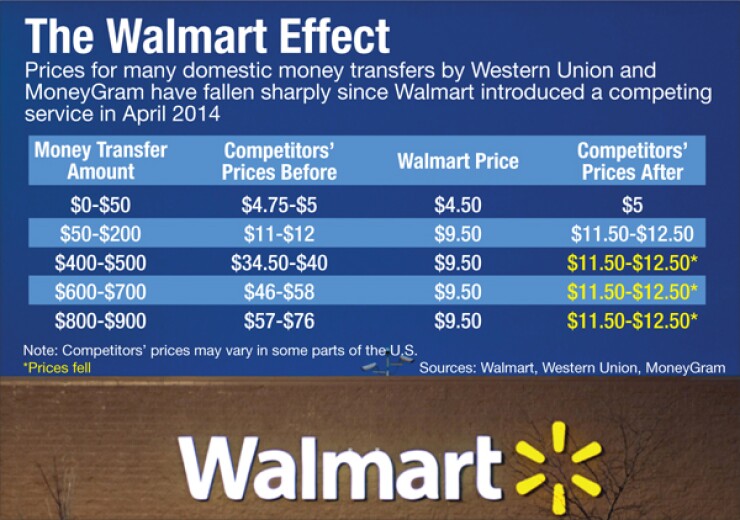-
International remittances grew at a number of banks last year, according to new data, but anti-money-laundering rules may make the fee-based business too expensive to keep.
March 2 -
Wal-Mart's new "Walmart-2-Walmart" transfer service will enable consumers to send money to each other by using the retail chain's store network.
April 17 -
The retail giant is making loans to small businesses, opening hundreds of in-store financial centers and investing in a prepaid marketer that happens to be buying a bank. To some, these latest actions, combined with the know-how it is gaining running a bank in Mexico and a card business in Canada, suggest that Wal-Mart is angling for another run at a U.S. banking charter. And next time around, its ambitions could go well beyond processing payments.
September 1

Without attracting much attention Walmart has drastically reshaped one small but lucrative corner of the U.S. financial services market over the last year, leading to far lower prices for consumers.
The Bentonville, Ark., company in April 2014
The new service, called Walmart 2 Walmart, had a rapid impact on MoneyGram, which sells its services inside Walmart stores. MoneyGram saw its domestic transactions at the retail behemoth fall by 37% last year, according to a securities filing. In October MoneyGram announced price reductions, saying that it would charge $11.50 for domestic money transfers of $50-$900.
Western Union held out longer, but last month it also succumbed to the competitive pressure by slashing its own prices to as little as one-sixth of what they were before.
As recently as last week,a $1,000 money transfer from one domestic Western Union agent to another cost as much as $86, according to the company's telephone customer-service line. But Western Union's website now shows that the same $1,000 money transfer costs just $12.50.
Western Union Chief Financial Officer Raj Agrawal confirmed the reduced $12.50 price Thursday during the company's quarterly earnings call, though he said that it applies only in parts of the country.
"We are making these adjustments at retail locations in areas where we are seeing the most competitive impact,"Agrawal said.
When asked about the impact of Walmart 2 Walmart, a spokeswoman for Englewood, Colo.-based Western Union said in an email: "The U.S.-to-U.S. retail money transfer market continues to be competitive."
Alex Holmes, the CFO at MoneyGram, said in an email: "Competition is good for business and good for the consumer." He added that MoneyGram is pleased with the results of its price changes.
In April 2014, when Walmart unveiled its domestic money transfer service, competitors were charging $34.50-$40 to send $400-$500, according a Walmart press release from the time. Competitors were charging $57-$76 to send $800-$900, Walmart said.
Walmart's dramatic impact on what Western Union and MoneyGram charge certain customers offers a reminder of why banks remain so fearful of the megastore's ambitions in consumer finance.
Walmart
And whereas banks operate their branches solely to sell financial products, for Walmart those revenues are mostly a bonus. The incremental cost of operating a Walmart MoneyCenter inside an existing store is small in comparison to the cost of running a bank branch.
"Given the size of Walmart, anything that they do is going to be concerning to any of the established players," said Philip Philliou, president of TruBeacon, a payments firm. "Walmart's proven to be adept at launching new services, and taking a long-term view, and learning and adjusting."
Of course, Walmart has also been stymied in financial services. Almost a decade ago, the company failed in its effort to get an industrial loan charter.
But more recently, Walmart has found ways to earn money from
The universe of transactions over which Walmart is currently competing with Western Union and MoneyGram is relatively small. Only 8% of Western Union's revenues come from domestic money transfers, according to the company.
Often this is money sent from one U.S.-based family member to another in an emergency. Or it might be a last-minute payment from a consumer to an auto lender, in order to stave off repossession.
For consumers, the advantage of these services is that the cash is available for pickup, within minutes, at a nationwide network of retail locations. Banks may be competitors to the extent that they offer wire transfers, but those services are generally only available to a bank's account holders.
Some observers are wondering whether Walmart has bigger ambitions for Walmart 2 Walmart. The service is powered by Ria, one of the world's largest money transfer companies. Walmart has 6,301 international stores in 26 foreign countries.
One potential expansion of Walmart 2 Walmart would be to enable U.S.-based immigrants to send money to relatives in their home country for pickup in a Walmart store. Foreign remittances are a far larger market than domestic money transfers.
"If the use case was the ability to send money from a Walmart store in New York to a Walmart store in Guadalajara, that's a much more interesting use case," Philliou said. "There you could see Walmart move the needle in a very significant way."
A Walmart spokeswoman declined to comment for this article.
Of course, Western Union and MoneyGram are both significant players in the foreign remittance market, as are some banks.
Western Union reported earnings of $203.9 million in the first quarter, up less than 1% from the same period a year earlier. MoneyGram reported a loss of $9.3 million in the quarter, down from a $27.3 million profit in the first three months of 2014.
During an earnings call Friday, MoneyGram Chief Executive Officer Pam Patsley said that investments in foreign markets are positioning the firm for future growth.
But she also acknowledged the impact of Walmart and Moneygram's reduced prices in the U.S. "These factors significantly reduced revenue and cash flow in the first quarter," she said.





